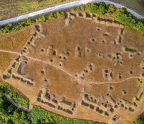MOVING WITH THE TIMES


Rush hour in Shenzhen features the crawling traffic jams of buses, trucks and cars you’ll see in most Asian megacities.
But there’s one difference here – the traffic is quieter. In the city’s central business district, blue buses and taxis whir to a stop to pick up commuters heading home in the evening humidity. Many of the vehicles carry the logo of BYD Auto, the electric-bus maker that is headquartered in the city.
In 2018, Shenzhen became the first city in the world to electrify its entire bus fleet – more than 16,000 vehicles. Its 22,000 taxis are virtually all electric, too, part of a big push to decarbonise transport in the industrial centre, which is just across the border from Hong Kong and officially home to 12 million people, or 20 million when unregistered workers and part-time residents are taken into account.







“I’ve converted to electric vehicles; they’re awesome.”
China’s $21 trillion economy and the growth that has transformed Shenzhen from a fishing village to an electronics powerhouse in 30 years is chiefly fuelled by coal-fired power stations. China produces nearly 30% of global CO2 emissions.
But it is also going green, spending large sums of money on wind, solar, hydro and nuclear energy to wean itself off coal, offering billions in subsidies for electric vehicles and infrastructure and cracking down on emissions.
A one-party state that plans a century ahead, China is simultaneously the best-equipped country to decarbonise quickly and the one with the biggest incentive to keep burning fossil fuels to maintain economic growth.
New Zealand has about 9500 diesel buses for everything from school runs to intercity coach services. A $12 billion infrastructure package announced by the Government this week went big on roading, which accounts for $5.3 billion of the $6.8 billion committed to transport. Rail received a significant boost, too, but with the exception of $371 million for the electrification of the 19km Papakura-Pukekohe line in South Auckland, there’s nothing specifically to decarbonise transport.
Our electric fleet amounts to a mere 20 or so buses and
You’re reading a preview, subscribe to read more.
Start your free 30 days





